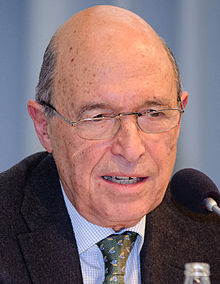This article has multiple issues. Please help improve it or discuss these issues on the talk page. (Learn how and when to remove these messages)
|
Costas Simitis | |||||||||||||||||||||||||||||||||||||||||||||||||||||||
|---|---|---|---|---|---|---|---|---|---|---|---|---|---|---|---|---|---|---|---|---|---|---|---|---|---|---|---|---|---|---|---|---|---|---|---|---|---|---|---|---|---|---|---|---|---|---|---|---|---|---|---|---|---|---|---|
| Κώστας Σημίτης | |||||||||||||||||||||||||||||||||||||||||||||||||||||||
 Simitis in 2012 | |||||||||||||||||||||||||||||||||||||||||||||||||||||||
| Prime Minister of Greece | |||||||||||||||||||||||||||||||||||||||||||||||||||||||
| In office 22 January 1996 – 10 March 2004 | |||||||||||||||||||||||||||||||||||||||||||||||||||||||
| President | Kostis Stephanopoulos | ||||||||||||||||||||||||||||||||||||||||||||||||||||||
| Preceded by | Andreas Papandreou | ||||||||||||||||||||||||||||||||||||||||||||||||||||||
| Succeeded by | Kostas Karamanlis | ||||||||||||||||||||||||||||||||||||||||||||||||||||||
| President of the Panhellenic Socialist Movement | |||||||||||||||||||||||||||||||||||||||||||||||||||||||
| In office 30 June 1996 – 8 February 2004 | |||||||||||||||||||||||||||||||||||||||||||||||||||||||
| Preceded by | Andreas Papandreou | ||||||||||||||||||||||||||||||||||||||||||||||||||||||
| Succeeded by | George Papandreou | ||||||||||||||||||||||||||||||||||||||||||||||||||||||
| |||||||||||||||||||||||||||||||||||||||||||||||||||||||
| Member of the Hellenic Parliament | |||||||||||||||||||||||||||||||||||||||||||||||||||||||
| In office 2 June 1985 – 7 September 2009 | |||||||||||||||||||||||||||||||||||||||||||||||||||||||
| Constituency | Piraeus A | ||||||||||||||||||||||||||||||||||||||||||||||||||||||
| Personal details | |||||||||||||||||||||||||||||||||||||||||||||||||||||||
| Born | 23 June 1936 Piraeus, Greece | ||||||||||||||||||||||||||||||||||||||||||||||||||||||
| Political party | Panhellenic Socialist Movement | ||||||||||||||||||||||||||||||||||||||||||||||||||||||
| Other political affiliations | PASOK – Movement for Change | ||||||||||||||||||||||||||||||||||||||||||||||||||||||
| Spouse |
Daphni Arkadiou (m. 1964) | ||||||||||||||||||||||||||||||||||||||||||||||||||||||
| Relations | Spiros Simitis (brother) | ||||||||||||||||||||||||||||||||||||||||||||||||||||||
| Children | Fiona Marilena | ||||||||||||||||||||||||||||||||||||||||||||||||||||||
| Alma mater | University of Marburg London School of Economics | ||||||||||||||||||||||||||||||||||||||||||||||||||||||
| Website | Official website | ||||||||||||||||||||||||||||||||||||||||||||||||||||||
Konstantinos G. Simitis (Greek: Κωνσταντίνος Γ. Σημίτης; born 23 June 1936) is a Greek retired politician who led the 'Modernization' movement of Greece. He succeeded in leadership Andreas Papandreou, the founder of the Panhellenic Socialist Movement (PASOK), and served as Prime Minister of Greece from 1996 to 2004.
Simitis was a founding member of PASOK, and he was appointed Minister of Agriculture in Papandreou’s first government. He stayed there until 1985. He was moved to be Minister of National Economy in 1985 when PASOK's profligacy needed a new financial 'stability' to be imposed in the form of an economic adjustment programme and this marked Simitis' subsequent reputation. With stability achieved and the party’s popularity waning, Andreas distanced himself from Simitis' policies and Simitis resigned. Simitis gained additional ministerial experience in 1989–90 as Education Minister in the Zolotas all-party government (and again later as Industry, Energy, Technology, and Commerce Minister from 1993 to 1995).
In 1996, Simitis won the leadership of PASOK after Papandreou's failing health. However, the leadership transition from Papandreou to Simitis was neither orderly nor 'friendly.' Simitis faced loyalists of the former Prime Minister who had spent much of their energy trying to prevent such a transition from ever taking place. From the outset, the less-than-dominant position Simitis held in his party circumscribed so many of his actions. By the time he had left office in 2004, however, Simitis had a number of significant achievements and reforms in the wider society and economy to proclaim: Greek entry into the Euro currency; the Cypriot accession into the EU; the successful completion of the Athens 2004 Summer Olympics; and the accomplishment of a variety of large-scale infrastructure projects (like the new Eleftherios Venizelos airport, the Athens ring road, Athens Metro, and Rio–Antirrio Bridge). New institutions were also introduced, such as the Greek Ombudsman and a number of regulatory bodies to supervise market liberalization.[1]
Under Simitis' governments, the Greek economy, after two decades of the exuberant rhetoric of his predecessors and financial stagnation,[2] was put in order by reducing inflation from an annual average of 15% to 3%, and budget deficits from more than 10% to 3%. The economy grew with an average annual increase of 4.1% of GDP.[3] Greece, under Simitis, was one of the fastest growing economies in Europe.[4]
Much later, after the debt crisis erupted in Greece in 2009, the legacy would be re-interpreted by critics as not being enough or misleading. Yet, under Simitis, Greece had seemingly strengthened its capacity for reform and had, indeed, appeared both more 'modern' and 'European.'[1]
- ^ a b Featherstone, Kevin; Papadimitriou, Dimitris (2015). Prime Ministers in Greece, The Paradox of Power. Oxford University Press. pp. 139–140.
- ^ "Simitis victory allows him to chart his own course".
- ^ "Greece GDP over the years".
- ^ Gallant, Thomas W. (2016). Modern Greece From the War of Independence to the Present. Bloomsbury Publishing. p. 306. ISBN 9781472567581.